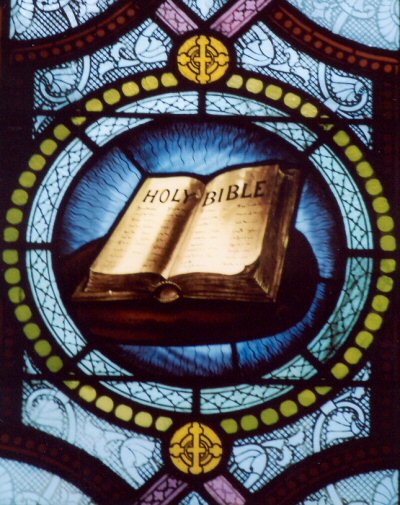
Liturgy of the Word
Seventeenth Sunday in Ordinary Time
July 25, 2010, Cycle C
Green priestly vestments symbolize hope and the vitality of
the life of faith.
Home Page
Liturgical
Year Cycle C 09-10
Introductory Acts Of Worship
The Entrance Prayers:
On Sunday, usually a hymn praising God
is sung in place of reciting a Psalm from the Bible which invites us to
enter more deeply into the mystery of God's love for us. The recited
weekday Psalm expresses a youthful heart and spirit, delighted that we may come
before the living God.
Entrance Song
/ Entrance Psalm (Antiphon)
Entrance Song
Psalm: 68:6-7, 36 God
is in his holy dwelling; he will give a home to the lonely, he gives power and
strength to his people.
The Priest Approaches and Kisses the Altar: The altar is a symbol of Christ. In it are cut five crosses to recall the five wounds of Christ. The altar also represents the Church and has embedded in it the relics of her saints. The priest comes to the altar to celebrate the Sacrifice in the Church's name. Because of the glory surrounding the altar upon which the divine Sacrifice will be made, the kiss of the priest unites the Church to Christ, its Redeemer.
Priest:
In the name of the Father, and of the Son, and of the Holy Spirit.
All:
Amen.
The Greeting:
We are welcomed in God's name. Our
response unites us to our neighbor, to the priest and to God. (The priest
may select from several forms of greeting).
Priest: The Lord
be with you.
All:
And also with you.
The Penitential Prayers:
We recognize our guilt for past sins,
express our sorrow for them, and ask that Mary, the angels, the saints, and our
brothers and sisters in Christ pray for the Lord God's mercy. (The priest
may select from several forms).
Priest: Coming together as
God's family, with confidence let us ask the Father's forgiveness, for he is
full of gentleness and compassion.
Lord Jesus, you raise us to new life: Lord, have mercy.
All: Lord, have
mercy.
Priest: Lord Jesus, you forgive us our sins: Christ, have
mercy.
All: Christ,
have mercy.
Priest: Lord Jesus, you feed us with your body and
blood: Lord, have mercy.
All: Lord, have mercy.
The Absolution:
Priest: May almighty God have mercy on
us, forgive us our sins, and bring us to everlasting life.
All:
Amen.
The Gloria: The Glory of God prayers have existed from the second century. They repeat the angels praise of God which heralded the birth of Christ on earth. Our praise is lifted again through the years as we rejoice at His coming as Lord, God, the most high Jesus Christ, who at Christmas took on our human nature while at the same time being the son of Man. This ancient hymn expresses our recognition of God's glory and love. It calls upon Christ as our holy and divine mediator, and the Holy Spirit who forever binds us together in God's love.
Priest and All:
Glory to God in the highest, and peace to his people
on earth. Lord God, heavenly King, almighty God and Father, we worship
you, we give you thinks, we praise you for your glory. Lord Jesus Christ,
only son of the Father, Lord God, Lamb of God, you take away the sins of the
world: have mercy on us; you are seated at the right hand of the Father: receive
our prayer. For you alone are the Holy One, you alone are the Lord, you
alone are the Most High, Jesus Christ, with the Holy Spirit, in the glory of God
the Father. Amen.
The Opening Prayer:
The
priest lifts the united prayers and petitions of the congregation to God the
Father through the merits of Jesus Christ in the Holy Spirit.
Priest: Let us pray. God our Father and protector, without you nothing is holy, nothing has value. Guide us to everlasting life by helping us to use wisely the blessings you have given to the world. We ask this through our Lord Jesus Christ, your Son, who lives and reigns with you and the Holy Spirit, one God, for ever and ever.

Liturgy of the Word
Christ is made known to us through the
Old Testament which prepares us to recognize Him. In those days, God
inspired men who spoke His message. Now, the New Testament Gospel reading
announces His presence to us directly through His Son. Both
readings bring God's message to us. Our responsibility is to respond.
The First Reading:
From the Old Testament
Priest/Reader: A reading from the
Book of Genesis.
First Reading: Genesis 18:20-32
In those days, the Lord said: "The outcry against Sodom and Gomorrah is so
great, and their sin so grave, that I must go down and see whether or not their
actions fully correspond to the cry against them that comes to me. I mean
to find out."
While Abraham's visitors walked on farther toward Sodom, the Lord remained standing before Abraham. Then Abraham drew nearer and said: "Will you sweep away the innocent with the guilty? Suppose there were fifty innocent people in the city; would you wipe out the place, rather than spare it for the sake of the fifty innocent people within it? Far be it from you to do such a thing, to make the innocent die with the guilty so that the innocent and the guilty would be treated alike! Should not the judge of all the world act with justice?" The Lord replied, "If I find fifty innocent people in the city of Sodom, I will spare the whole place for their sake." Abraham spoke up again: "See how I am presuming to speak to my Lord, though I am but dust and ashes! What if there are five less than fifty innocent people? Will you destroy the whole city because of those five?" He answered, "I will not destroy it, if I find forty-five there." But Abraham persisted, saying "What if only forty are found there?" He replied, "I will forbear doing it for the sake of the forty." Then Abraham said, "Let not my Lord grow impatient if I go on. What if only thirty are found there?" He replied, "I will forbear doing it if I can find but thirty there." Still Abraham went on, "Since I have thus dared to speak to my Lord, what if there are no more than twenty?" The Lord answered, "I will not destroy it, for the sake of the twenty." But he still persisted: "Please, let not my Lord grow angry if I speak up this last time. What if there are at least ten there?" He replied, "For the sake of those ten, I will not destroy it."
Priest/Reader:
The Word of the
Lord.
All:
Thanks
be to God.
The Responsorial Psalm:
This Psalm praising God, is a prayer to God,
or recommends the practice of virtue. It is sung as an interlude between
the scriptural readings. It provides yet another instructional setting and
invites the assembly to imitate the cantor who sings a repeated response to the
verses of an ancient Psalm many of which are attributed to King David. The
verses are sung first by a cantor (song leader) accompanied by instruments, the
refrain is sung by the people.
Psalm 138:1-2, 2-3, 6-7, 7-8
Cantor: Lord, on the day I called for help, you answered, you
answered me.
All: R/.
Lord, on the day I called for help, you answered, you answered me.
Cantor: I will give thanks to you, O Lord, with all my heart,
for you have heard the words of my mouth; in the presence of the angels I will
sing your praise; I will worship at hour holy temple and give thanks to your
name.
All: R/.
Lord, on the day I called for help, you answered, you answered me.
Cantor: Because of your kindness and your truth; for you have
made great above all things your name and your promise. When I called you
answered me; you built up strength within me.
All: R/.
Lord, on the day I called for help, you answered, you answered me.
Cantor: The Lord is exalted, yet the lowly he sees, and the
proud he knows from afar. Though I walk amid distress, you preserve me;
against the anger of my enemies you raise your hand.
All: R/.
Lord, on the day I called for help, you answered, you answered me.
Cantor: Your right hand saves me. The Lord will
complete what he has done for me; your kindness, O Lord, endures forever;
forsake not the work of your hands.
All: R/.
Lord, on the day I called for help, you answered, you answered me.
The Second Reading:
Taken from the New Testament, often from a
letter written by St. Paul.
Priest/Reader: A Reading
from the letter of Saint Paul to the Colossians.
Second Reading: Colossians 2:12-14
Brothers and sisters: You were buried with him in baptism, in which
you were also raised with him through faith in the power of God, who raised him
from the dead. And even when you were dead in transgressions and the
uncircumcision of your flesh, he brought you to life along with him, having
forgiven us all our transgression; obliterating the bond against us, with its
legal claims, which was opposed to us, he also removed from our midst, nailing
it to the cross.
Priest/Reader: The
word of the Lord.
All: Thanks
be to God.
The Alleluia:
An ancient expression of joy anticipating
the Lord's message we will hear in the Gospel.
Romans 8:15bc
Cantor: Alleluia! Alleluia!
Alleluia!
All: R/. Alleluia! Alleluia!
Alleluia!
Cantor: You have received a Spirit of a adoption, through
which we cry, Abba, Father.
All: R/. Alleluia!
Alleluia! Alleluia!
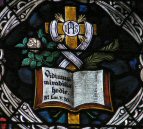 The Gospel:
The Liturgy of the Word is completed
by the reading of the Gospel. Before its reading, the members of the
assembly trace the sign of the cross upon the forehead to indicate their mental
acceptance of the Truth, on the lips to indicate their readiness to announce it,
and over the heart to indicate their sincere desire to accept it into their
lives. The "Good News" of the Gospel tells that God's kingdom has come for
all to hear, accept, and announce to the world for its salvation. It
is God who is speaking to us. Christ comes to teach us by the example of
His life and by His own words.
The Gospel:
The Liturgy of the Word is completed
by the reading of the Gospel. Before its reading, the members of the
assembly trace the sign of the cross upon the forehead to indicate their mental
acceptance of the Truth, on the lips to indicate their readiness to announce it,
and over the heart to indicate their sincere desire to accept it into their
lives. The "Good News" of the Gospel tells that God's kingdom has come for
all to hear, accept, and announce to the world for its salvation. It
is God who is speaking to us. Christ comes to teach us by the example of
His life and by His own words.
Priest: Cleanse my heart and my lips, almighty God, that I may worthily proclaim your
holy Gospel. Through the words of the Gospel may our sins be wiped away.
Priest: The Lord be with you.
All: And
also with you.
Priest/Deacon: A
reading from the holy Gospel according
to Luke.
All: Glory
to you, Lord.
The Gospel: Luke 11:1-13
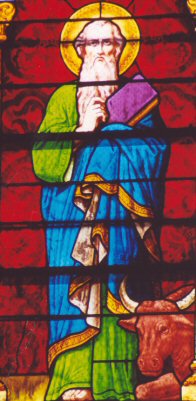 Jesus
was praying in a certain place, and when he had finished, one of his disciples
said to him, "Lord, teach us to pray just as John taught his disciples."
He said to them, "When you pray, say: Father, hallowed be your name, your
kingdom come. Give us each day our daily bread and forgive us our sins for
we ourselves forgive everyone in debt to us, and do not subject us to the final
test."
Jesus
was praying in a certain place, and when he had finished, one of his disciples
said to him, "Lord, teach us to pray just as John taught his disciples."
He said to them, "When you pray, say: Father, hallowed be your name, your
kingdom come. Give us each day our daily bread and forgive us our sins for
we ourselves forgive everyone in debt to us, and do not subject us to the final
test."
And he said to them, "Suppose one of you has a friend to whom he goes at midnight and says, 'Friend, lend me three loaves of bread, for a friend of mine has arrived at my house from a journey and I have nothing to offer him,' and he says in reply from within, 'Do not bother me; the door has already been locked and my children and I are already in bed. I cannot get up to give you anything.' I tell you, if he does not get up to give the visitor the loaves because of their friendship, he will get up to give him whatever he needs because of his persistence.
"And I tell you, ask and you will receive; seek and you will find; knock and the door will be opened to you. For everyone who asks, receives; and the one who seeks, finds; and the one who knocks, the door will be opened. What father among you would hand his son a snake when he asks for a fish? Or hand him a scorpion when he asks for an egg? If you then, who are wicked, know how to give good gifts to your children, how much more will the Father in heaven give the Holy Spirit to those who ask him?"
Priest/Deacon: The Gospel of the Lord.
All: Praise
to you, Lord Jesus Christ.
The Priest's Sermon:
The priest develops, explains, and comments upon the Master's words,
so our minds may be
enlightened, and our
hearts enriched.
(A priestly reflection upon this Gospel)
Profession of Faith:
We state in the
Nicene Creed the principles of our faith in precise and definite terms.
All: We believe in one God, the Father, the Almighty, maker of heaven and earth, of all that is seen and unseen. We believe in one Lord, Jesus Christ, the only Son of God, eternally begotten of the Father, God from God, Light from Light, true God from true God, begotten, not made, one in Being with the Father. Through him all things were made. For us men and for our salvation he came down from heaven: by the power of the Holy Spirit he was born of the Virgin Mary, and became man. For our sake he was crucified under Pontius Pilate; he suffered, died, and was buried. On the third day he rose again in fulfillment of the Scriptures; he ascended into heaven and is seated at the right hand of the Father. He will come again in glory to judge the living and the dead, and his kingdom will have no end. We believe in the Holy Spirit, the Lord, the giver of life, who proceeds from the Father and the son. With the Father and the Son he is worshipped and glorified. He has spoken through the Prophets. We believe in one holy catholic and apostolic Church. We acknowledge one baptism for the forgiveness of sins. We look for the resurrection of the dead, and the life of the world to come. Amen.
General Intercessions:
We pray for the needs of the pope, civic
leaders, our own needs, those of others,
the sick, the dying, those who have died, the church, and the world.
The response of all to each intercession: Lord, hear our prayer.
All: Lord,
hear our prayer.
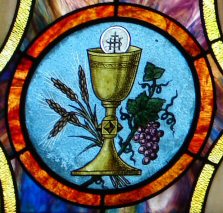 The Liturgy of the Eucharist
The Liturgy of the Eucharist
Gifts of bread and wine symbolizing ourselves are presented to the priest who will offer them to God the Father. Through the Holy Spirit, they will become the Body and Blood of Jesus Christ whom we receive in Holy Communion. Jesus unites Himself with us for our spiritual nourishment and strength. Today, when individuals do not present their own personal offerings of bread and wine, the monetary contribution symbolizes the material of their united sacrifice.
Preparation of the Bread and
Wine:
Priest: Blessed are you, Lord, God of all creation, for through your goodness we have
received the bread we offer you;
fruit of the earth and work of human hands, it will become for us the bread of life.
All:
Blessed be God for ever.
Priest: By the mystery of this water and wine may we come to
share in the divinity of Christ, who humbled himself to share
in our humanity.
Priest: Blessed are you, Lord God of all creation, for through your goodness we have
received the wine we offer you; fruit
of the vine and work of human hands it will become our spiritual drink.
All: Blessed be God for ever.
Priest: Lord
God, we ask you to receive us and be pleased with the sacrifice we offer you
with humble and contrite hearts.
The Priest's Hands are Washed: This
act was traditional necessary because the priest handled the various gifts
presented by the people. Now, the cleansing act using water reminds the
priest and ourselves of the need to cleanse not only the hands but the soul.
Soon, the priest's hands will hold the actual body of Christ, and we will become
His dwelling place.
Priest: Lord,
wash away my iniquity; cleanse me from my sin.
Pray, brethren, that
my sacrifice and yours may be acceptable to God, the almighty Father.
All: May the Lord accept the sacrifice at your hands, for the praise and glory of his
name, for our good, and the good of
all his holy Church.
Prayer over the Gifts:
Speaking in our name, the priest asks
the Father to accept the gifts we offer through him.
Priest: Lord, receive these
offerings chosen from your many gifts. May these mysteries make us holy
and lead us to eternal joy. Grant this through Christ our Lord.
All: Amen.
Eucharistic Prayer: (Number Four: The priest may select from several forms).
Priest: The Lord be with you.
All: And also with you.
Priest: Lift up your hearts.
All: We lift them up to the Lord.
Priest: Let us give thanks to the Lord, our God.
All: It is right to
give him thanks and praise.
Preface Prayer:
Priest: Father, all-powerful and ever-living God, we do well always and everywhere to give you thanks. We see your infinite power in your loving plan of salvation. You came to our rescue by your power as God, but you wanted us to be saved by one like us. Man refused your friendship, but man himself was to restore it through Jesus Christ our Lord. Through him the angels of heaven offer their prayer of adoration as they rejoice in your presence for ever. May our voices be one with theirs in their triumphant hymn of praise:
Acclamation:
Priest
and All:
Holy, Holy, Holy Lord, God of power and might, Heaven and
earth are full of your glory. Hosanna in the highest. Blessed
is he who comes
in the name of the Lord. Hosanna in the highest.
Priest: Father, we
acknowledge your greatness: all your actions show your wisdom and love.
You formed man in your own likeness and set him over the whole world to serve
you, his creator, and to rule over all creatures. Even when he disobeyed
you and lost your friendship you did not abandon him to the power of death, but
helped all men to seek and find you. Again and again you offered a
covenant to man, and through the prophets taught him to hope for salvation.
Father, you so loved the world that in the fullness of time you sent your only
Son to be our Savior.
He was conceived through the power of the Holy Spirit, and born of the Virgin Mary, a man like us in all things but sin. To the poor he proclaimed the good news of salvation, to prisoners, freedom, and to those in sorrow, joy. In fulfillment of your will he gave himself up to death; but by rising from the dead, he destroyed death and restored life. And that we might live no longer for ourselves but for him, he sent the Holy Spirit from you, Father, as his first gift to those who believe, to complete his work on earth and bring us the fullness of grace.
Priest: Father, may this Holy Spirit sanctify these offerings. Let them become the body and blood of Jesus Christ our Lord as we celebrate the great mystery which he left us as an everlasting covenant.
He always loved those who were his own in the world. When the time came for him to be glorified by you, his heavenly Father, he showed the depth of his love.
The priest repeats the words which
Christ used at his Last Supper when He changed the bread into His Body and the
wine into His Blood. His Body and Blood are truly present but under the
appearance of bread and wine. The death of Christ is prolonged in each of
those who receive Him worthily. We apply His death to ourselves so that we
may share His glory. This moment is the most solemn on earth because it is
Divine act which enables us to apply to ourselves the Cross which Christ
willingly took upon Himself.
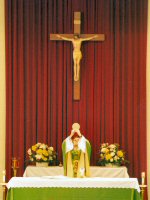 We are called to die to sin and
lift our very selves to God so that we become changed; to do as God would have
us do, to become what God would have us become. Our own little cross can
lift us into union with Christ's Cross so we may earn the joys of everlasting
happiness with God the Father.
We are called to die to sin and
lift our very selves to God so that we become changed; to do as God would have
us do, to become what God would have us become. Our own little cross can
lift us into union with Christ's Cross so we may earn the joys of everlasting
happiness with God the Father.
The
Lord's Supper:
While they were at supper, he took bread,
said the blessing, broke the bread, and gave it to his disciples, saying:
Take this, all of
you and eat of it: for this is my Body which will be given up for you.
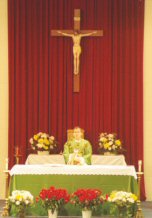 In
the same way, he took the cup, filled with wine. He gave you thanks, and
giving the cup to his disciples, and said:
In
the same way, he took the cup, filled with wine. He gave you thanks, and
giving the cup to his disciples, and said:
Take this, all of you, and drink from it; for this is the chalice of my
Blood, the Blood of the new and eternal covenant; which will be poured out for you and for many for the
forgiveness of sins. Do this in memory of me.
Memorial Acclamation: (The priest may
select from several forms).
Priest: Let us proclaim the mystery of faith:
Priest
and All: Christ
has died, Christ is risen, Christ will come again.
Priest: Father, we now celebrate this memorial of our redemption. We recall Christ's death, his descent among the dead, his resurrection, and his ascension to your right hand; and, looking forward to his coming in glory, we offer you his body and blood, the acceptable sacrifice which brings salvation to the whole world.
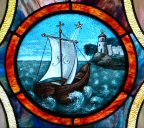 Lord, look upon this
sacrifice which you have given to your Church; and by your Holy Spirit, gather
all who share this one bread and one cup into the one body of Christ, a living
sacrifice of praise.
Lord, look upon this
sacrifice which you have given to your Church; and by your Holy Spirit, gather
all who share this one bread and one cup into the one body of Christ, a living
sacrifice of praise.
Lord, remember those for whom we offer this sacrifice, especially _____
our Pope, _____ our bishop, and bishops and clergy everywhere. Remember
those who take part in this offering, those here present and all your people,
and all who seek you with a sincere heart. Remember those who have died in
the peace of Christ and all the dead whose faith is known to you alone.
Father, in your mercy grant also to us, your children, to enter into our
heavenly inheritance in the company of the Virgin Mary, the Mother of God, and
your apostles and saints. Then, in your kingdom, freed from the corruption
of sin and death, we shall sing your glory with every creature through Christ
our Lord, through whom you give us everything that is good.
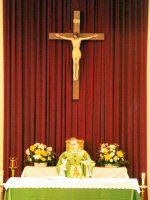 Doxology:
Doxology:
Prayer of Praise: Through him, with him,
and in him, in the unity of the Holy Spirit, all glory and honor is yours,
almighty Father, for ever and ever. Amen.
All: Amen.
Communion Rite
In the Liturgy of the Eucharist, we symbolically offer ourselves to the Lord through the gifts of bread and wine. At the Consecration, we offer our very lives to be united the God the Father through the Cross of Christ. In Communion, we find that we have not died at all, but have come to life. We have surrendered ourselves to God through His Divine Son, Jesus Christ. In return become ennobled and enriched. We give up time and we get eternity, we give up our sin and we receive grace, we surrender our self-will and receive the strength of the Divine Will, we give up ourselves and we receive everything. For the Son of God says to us that unless we receive Him we shall not have Divine life in us. But it is not really we who receive Christ as it is Christ who receives us, bringing us into Himself.
God makes His Cross the very means
of our salvation and our life. While we have crucified Him, His eternal
love cannot be extinguished. Christ willed to give us the very life we
crucified in our Redemption, the Consecration of Holy Thursday into Communion,
His death into our everlasting life.
The Lord's
Prayer:
Priest: Let us pray with confidence to the Father in the words
our Savior gave us.
Priest and
All: Our
Father, who art in heaven, hallowed be they name; Thy kingdom come; Thy will be
done on earth as it is in
heaven. Give us this
day our daily bread; and forgive us our trespasses as we forgive those who
trespass against us; and lead us not into temptation, but deliver us from evil.
All: For the kingdom, the power and
the glory are yours, now and for ever.
Prayer for Peace:
Priest: Lord Jesus Christ, you said to your apostles,
peace I leave you, my peace I give you, look not on our sins, but on the faith
of your Church, and graciously grant her peace and unity in
accordance with your will. Who live and reign for ever and ever.
All: Amen.
Priest: The peace of the Lord be with you always.
All: And with your spirit.
Priest: Let us offer each other the sign of peace.
Breaking of the Bread:
Priest and All: Lamb of God, you take away the sins of the
world, have mercy on us.
Lamb of God, you take away the sins of the world, have mercy on us.
Lamb
of God, you take away the sins of the world, grant us peace.
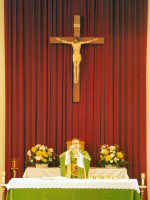 Communion of the Priest:
Communion of the Priest:
Priest: May this mingling of the body and blood
of our Lord Jesus Christ bring eternal life to us who receive it.
Priestly Preparation: Lord Jesus Christ, Son of the living God, who by the will of the Father and the
work of the Holy Spirit, through
your death gave life to the world. By your holy body and blood free me
from all my sins, and from every evil. Keep me faithful to your teaching,
and never let me be parted from you.
Priest: This is the Lamb of God who takes away the sins of the world. Happy are
those who are called to his supper.
Priest and All: Lord,
I am not worthy to receive you, but only say the word and I shall be healed.
Priest: May the Body of Christ keep me safe for eternal life.
May the Blood of Christ keep me safe for eternal life.
Communion Antiphon:
Communion Song: Psalm 103:2
O bless the Lord, my soul, and remember all his kindness.
Communion of the Faithful:
Priest: The Body of Christ.
All: Amen.
Priest:
The Blood of Christ.
All: Amen.
Cleansing of the Vessels:
Priest: Lord,
may I receive these gifts in purity of heart. May they bring me healing
and strength, now and for ever.
Prayer after Communion:
Priest: Let us pray.
Priest: Lord, we receive the sacrament which celebrates the memory
of the death and resurrection of Christ your Son. May this gift
bring us closer to our eternal salvation. We ask this through Christ our
Lord.
All: Amen.
Concluding Rite
Priest: The Lord be with you.
All: And also with you.
Priest: Bow your heads and let us pray for God's blessing.
Dismissal Prayer: (The priest may select
from several forms)
Priest:
Lord, we rejoice that you are your creator and ruler. As we call
upon your generosity, renew and keep us in your love. Grant this through
Christ our Lord.
Priest:
May almighty God bless you, the Father, and the Son, and the Holy Spirit.
All:
Amen.
Priest: Go in peace to love and serve the Lord.
All: Thanks be to God!
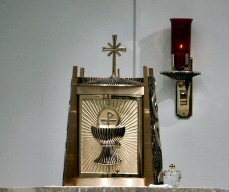
O my Jesus, forgive us our sins.
Save us from the fires of hell.
Lead all souls to heaven,
especially those in most need of your mercy.
www.Divinemasterplanforlife.com
www.Saintsnheaven.com
Top
Home Page
Liturgical
Year Cycle C 09-10